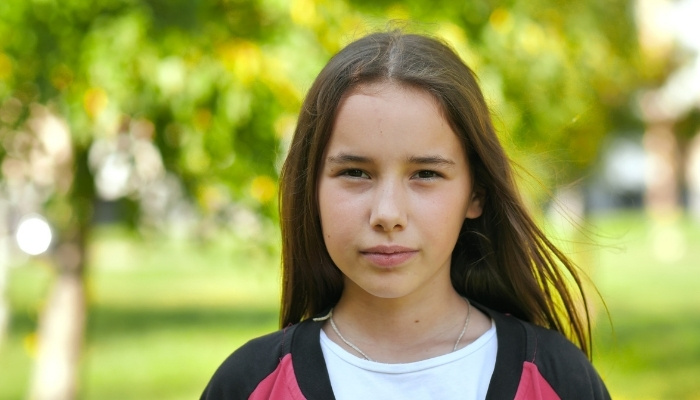It appears that children are developing at a quicker pace nowadays, possibly because of influences from social media, their friends, and their families.
However, developmental growth is happening in the same timeline it always has. This leaves parents questioning what is appropriate for their child at each age.
Can 11-year-olds date? No, an 11-year-old is not emotionally mature or physically developed enough to participate in standard dating practices. However, allowing romantic interactions to take place in a safe and supervised environment can be beneficial for your tween.
Keep reading to learn more about how social and emotional development, romantic inclinations, and societal pressures play a role in your tween’s life.
Understanding how these factors impact their behavior will allow you to make the best decisions for your child.
11-Year-Olds and Dating – What To Know
The American Academy of Pediatrics has concluded that, on average, children start dating between the ages of 12-13. Some preteens may be ready to begin dating sooner or later, but what does that look like?
Is 11 Too Young To Date?
Dating in a traditional sense involves understanding boundaries, bodily autonomy, and aligning life goals.
Meanwhile, children at this age have just reached the cognitive milestone in which they’re capable of anticipating the long-term effects of choices and behaviors.
They do not yet possess the self-awareness and emotional maturity that a romantic relationship requires. However, there are ways to allow your child to “date” in an age-appropriate way.
11-Year-Old Behavior
During the middle school years, a tween becomes more concerned about their social environment. An increased focus on group belonging means that your 11-year-old will be more susceptible to peer pressure and impulsive decisions.
Around this time, they will become less interested in their home life with a growing focus on friendship and self.
11-Year-Old Emotional Development
Children around this age are often entering or transitioning through puberty. This means that your 11-year-old is likely going through hormonal changes that can cause a disruptive impact on their emotions.
Their feelings are becoming more intense, but the part of the brain that regulates emotion and aids in decision-making isn’t fully formed. Due to this, your tween may appear moodier and more sensitive.
Tween Dating in Today’s World
Social media exposes tweens to sensitive topics at a younger age. It also allows them an avenue of communication with others and an opportunity to search for answers to their curiosities.
Due to this, children experience more external pressure to mature than their parents did at the same age.
Additionally, for tweens, dating is mainly about possessing a title. While there may be feelings developing, the drive for social recognition and belonging is higher than that of intimacy.
What To Allow
Allowing your child to explore their feelings in a safe, controlled, and supervised environment can be beneficial. It opens lines of communication that will be important once they start partaking in romantic relationships further down the road.
Certain situations may be acceptable if your 11-year-old is showing an interest in dating.
- Group dates: Time at the mall, skating rink, or movie theater with a group of friends and an adult chaperone.
- School events: Time at a sporting event, dance, or club activity with a crush and an adult chaperone.
- Family activities: Inviting their crush to birthday parties or game nights.
Where To Draw the Line
If you notice your child developing negative habits due to their relationship, it’s time to have a genuine conversation.
They may not fully understand and will inevitably show resistance. However, compassionate guidance and acceptance will go a long way.
Some warning signs include:
- Grades declining
- Isolating from family or friends
- Losing interest in hobbies
- Not sleeping or eating
- Showing obsessive or compulsive behavior
- Changing the way they look, act, or talk

Tween Dating
Now that you know where your child stands developmentally, it’s time to acknowledge what tween dating entails. If you decide to allow your tween to date, here are the things you need to know.
What Dating Involves for Tweens
As mentioned, tween dating stems from a need for social belonging combined with growing emotional awareness.
It involves complex interaction in a group dynamic, more public pronouncements of affection, and exploration of personal style and taste.
While their feelings are valid, they are often driven by what status their crush offers them rather than who they are as a person.
Tween Dating Pros & Cons
Here are the benefits of tween dating:
- It could be a positive experience that brings happiness.
- It may fulfill a desire for belonging.
- They’ll get to know themselves better.
- They’ll begin understanding social compatibility.
Here are the drawbacks of tween dating:
- Potential for heartbreak, bullying, and rejection.
- Overly stimulating or mature situations.
- Inability to balance home life, social life, and self-care.
- Harm to social and emotional development may occur if a traumatic situation arises.
Guidelines for Tween Dating
As a parent, deciding what is permitted for your child is between you and them. However, there are general recommendations that may help guide parents during this time.
- Keep PDA minimal: At this age, children simply aren’t ready for physical intimacy. Small acts lead way to larger ones, so conversing with your child and setting boundaries is vital.
- Set digital boundaries: While experts don’t recommend frequently checking your child’s phone, boundaries should be established. Communicate with your child about online behavior, when you’ll check their phones, and the consequences of violating digital rules.
- No solo dates: Being with someone one-on-one has the potential to put your tween in situations they aren’t developmentally equipped to handle.
Related Questions:
Is 14 a Good Age To Start Dating?
14-year-olds dating people of the same age is socially and ethically acceptable. However, dating at a young age warrants a conversation about safety, expectations, and rules.
Can an 11-Year-Old Stay Home Alone?
An 11-year-old is typically self-sufficient enough to stay home alone for short periods of time totaling less than 1-2 hours.
However, leaving your child home alone can be a criminal offense if it places them at risk. Never leave your 11-year-old home alone overnight or if the weather is dangerous.
Conclusion
11-year-olds cannot be involved in an intimate romantic relationship. However, there are situations in which your child should safely be able to express their feelings.
As they develop an interest in dating, guide them with intention and acceptance while maintaining established boundaries.
Charley is a mother of three with a passion for raising good humans. With her children in tow, she studies English and has made a career creating content about motherhood. In her free time, she enjoys traveling within the states to kayak, camp, and hike.

